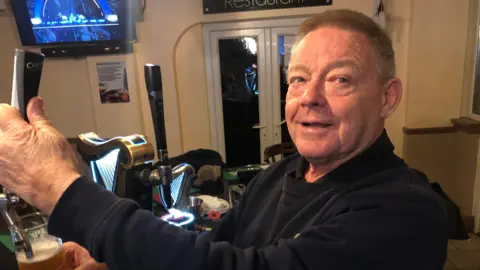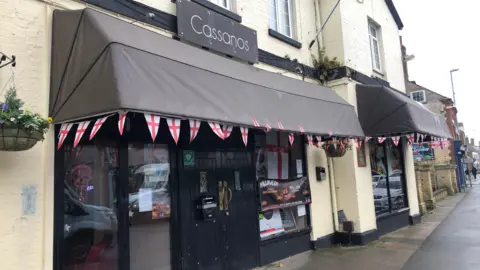Venue closes nightclub after a drop in customers
 John Devine/BBC
John Devine/BBCA man who runs a venue in a market town has stopped hosting weekly nightclub sessions after 24 years because of a drop in customers.
Kevin McCourt, 71, owns a bar, restaurant and nightclub called Cassanos in March, Cambridgeshire.
The business owner said trade has never been so bad in the 50 years he has worked in hospitality. He believed the government's Budget, which will be announced on Wednesday, could "make or break his business".
A HM Treasury spokesperson said: “We’re supporting businesses, including nightclubs, through pledges to make the business rates system fairer, cap corporation tax at 25% and to publish a corporate tax roadmap."
"We need help, the leisure industry needs help, it's a disaster," said Mr McCourt.
"We are fighting a losing battle, I have had to close the weekend nightclub sessions, we are just not taking any money. People buy cheap booze from the supermarket and don't come out till much later. When they do get here, they're not spending like they did."
Mr McCourt believed customers could not afford to have nights out because the cost-of-living crisis has been taking all of their spare cash.
He said he was worried about the implications of the chancellor's Budget and was fearful that a rise on alcohol duty could be "catastrophic" for the industry.
A Treasury spokesperson said that alcohol duty was currently frozen until 1 February 2025.
 John Devine/BBC
John Devine/BBCThe business employs up to 14 people, and Mr McCourt said they would all lose hours and pay when the sessions close.
Mr McCourt said it could be another "nail in the coffin" for the sector if the government implements a rise in employers' contributions to National Insurance, and he would be "forced to take a long hard look" at his labour force.
"We don't open like we used to," said Mr McCourt. "We shut at 21:00 GMT on Fridays now, done by 16:00 GMT on Sundays, not open at all on a Tuesday, it wasn't like this before. If it gets any worse, I'll have to lay staff off."
Mr McCourt said he was hoping for some help in the Budget on heating, lighting and power bills and that assistance over reduced business rates would continue.
"If they put fuel duty up, that will have a knock-on effect on people's everyday spending.
"It seems the worst it has ever been," said Mr McCourt. "It's even worse than when we had the pandemic lockdowns."
A Treasury spokesperson said: "We do not comment on speculation around future tax policies and the chancellor makes tax decisions at fiscal events.
"The chancellor has been clear that difficult decisions lie ahead to fix the foundations and address the £22bn hole the government has inherited. Decisions on how to do that will be taken at the upcoming Budget."
The Night Time Industries Association (NTIA) have called for immediate government action on the decline of nightclubs, urging the chancellor to extend business rates relief in the autumn Budget.
“Nightclubs are facing an unprecedented crisis," says Michael Kill, the chief executive officer of the NTIA.
"Since June 2020, we’ve been losing two nightclubs every week, but in the past six months, this has escalated to three per week. This rapid decline is devastating for our economy, culture and communities.
“Despite contributing millions in taxes, we are burdened with rising costs and a lack of essential public services. Late-night transport is unreliable, police presence is scarce, and venues are forced to spend on security and cleaning – services that should be publicly provided.
"Additionally, bureaucratic systems around licensing and planning are inconsistent and definitely not conducive to growth, weighing us down at every point," he added.
Follow Cambridgeshire news on BBC Sounds, Facebook, Instagram and X.
